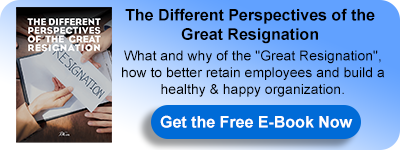Resignation or Disengagement?
The fact is, most employees are either not engaged or intentionally disengaged. According to Gallup's State of the Global Workplace: 2021 Report, global employee engagement is at 20%, with 34% in the United States and Canada.
And disengagement has a high price tag:
- Employees who are not engaged or actively disengaged lose 18 percent of their annual compensation in lost productivity.
- Disengagement costs $60.3 million per year for a company of 10,000 employees with an average compensation of $50,000.
- It costs one-half to two times a worker's annual income to replace them. Keeping each disengaged worker costs $9,000 per year, whereas replacing them costs between $25,000 and $100,000.
It's being titled the "Great Resignation," According to Gallup data, it has nothing to do with industry, role, or compensation. It's a problem in the workplace.
Given that most of the current workforce is disengaged, each new worker will likely be assigned to a disengaged team and will probably not stay long.
This is a self-defeating loop, but it can be broken — and the local manager is the most effective breaker. According to Gallup, it takes more than a 20% salary boost to entice most employees away from a manager who engages them and almost nothing to entice most disengaged people away.
Managers must achieve the 12 essential aspects of engagement to engage employees. These factors include everything from knowing what to expect at work to learning and improving. Engaged employees are healthier, more resilient, and better performers because engagement and wellbeing are linked.
They're also more trustworthy. Engagement reduces turnover in crucial high-turnover roles by 36 percentage points. It reduces the 100-day attrition rate by nine points, according to one Gallup customer focused on driving organic growth through influential workplace culture.
It isn't challenging to deliver engagement and wellbeing elements, but most managers require assistance to do so correctly. Managers may learn to have meaningful dialogues, set expectations and hold people accountable, individualize performance management to get the most out of individuals and build an employee experience that keeps employees happy.
1Gallup, 22 July 2021, VIPULA GANDHI AND JENNIFER ROBISON, The Great Resignation is Really the Great Discontent, Accessed 20 Dec 2021, https://www.gallup.com/workplace/351545/great-resignation-really-great-discontent.aspx
For more about this topic, download our latest book " The Different Perspectives of the Great Resignation " for FREE:
